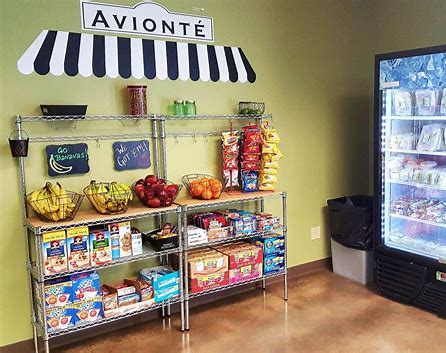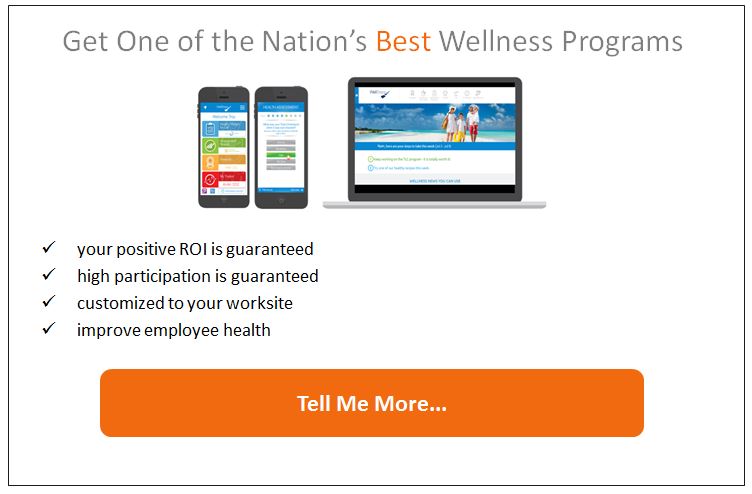It’s common knowledge that promoting health at work is crucial. But when it comes to investing in workplace health programs, companies want to make sure they’re spending wisely. After all, the goal is to see real benefits, especially in terms of employee health and happiness.
The most important return is employee health and happiness. Proven workplace health promotion program examples are what we’ll be describing in this article today.

When employees feel good and are satisfied, they’re more likely to show up and do their best. For business owners, it’s not just about surviving; it’s about thriving. And the key to success often lies in making health initiatives easily accessible.
Offering programs that promote health only works if the employees use them.
Offering programs that promote health only works if the employees use them, and starting with proven workplace health promotion program examples is a great place to start.
What Is A Workplace Health Promotion Program?
A workplace health program is a comprehensive approach aimed at improving various aspects of health, including knowledge, attitudes, skills, and behaviors. These programs don’t just benefit individuals; they also create healthier work environments, which can extend positive effects to employees’ families and communities.
There are various interventions available, from programs to help people quit smoking to making routine healthcare services more accessible for preventive care. The key is to find what works best for employees and encourages their participation.
In our search for effective workplace health initiatives, we’ve analyzed data to find strategies that really make a difference. By showcasing successful examples supported by evidence, we hope to guide companies toward building healthier and happier teams.
By adopting proven approaches and learning from successful programs, companies can not only improve their employees’ well-being but also create a more vibrant workplace culture. After all, a healthy workforce is often the foundation of a successful business.
RELATED: 7 Ways A Virtual Wellness Program Makes Employees Healthy
Workplace Health Promotion Program Examples That Work
With the overwhelming number of services available, it can be difficult to know which programs are sure to prove results.
So we’ve found ones with the best results.
1. Programs designed to help people quit smoking.
One of the best workplace health promotion examples that work is a program designed to help workers quit smoking. The greatest thing about this program is how many free services are available.

Smokefree.gov is dedicated to helping people quit smoking. Filled with tools, tips, and online chat support, this website is filled with information and success stories for those serious about quitting.
CDC.Com is another excellent free resource for companies to help their team members who struggle with nicotine take the first step toward a healthier life to quit smoking.
Check out this alarming fact:
“Tobacco use is the leading cause of preventable disease, disability, and death in the United States. As of 2018, about 34 million US adults smoke cigarettes, and every day, about 1,600 young people under 18 try their first cigarette. In addition, 58 million people who don’t smoke are exposed to secondhand smoke every year.” CDC.com
Tobacco use programs aren’t only designed to help people quit but, more importantly, prevent them from starting use in the first place. Additionally, they help companies reduce people’s exposure to secondhand smoke.
RELATED: 7 Simple Strategies To Integrate Health And Wellness Programs In The Workplace
2. Access to Healthy Food
The leaders of corporate wellness programs learned years ago that giving their employees access to healthy food options was one of the most effective ways to keep their team’s performance levels up throughout the day.
By incorporating proven approaches that make healthy living more accessible by offering access to healthy food. This might sound complex, but it doesn’t have to be.
- Stock break rooms with healthy snacks
- Consider providing a food delivery service as an incentive, such as Imperfect Foods or Perfectly Imperfect Produce (this will be a big hit with your millennial team members!)
“A healthy diet and regular physical activity can help prevent weight gain, heart disease, stroke, type 2 diabetes, and some kinds of cancer. However, only about 1 in 10 US adults eats enough fruits or vegetables…In addition, only 54% of adults get enough aerobic physical activity, and nearly 74% have overweight or obesity.” CDC.com

3. Physical Activity Opportunities
A quick google search on how exercise improves brain functions results in over 33 million results. When we move, we feel better. It’s no wonder, so many of us had such a hard time when we left our recess days behind as we moved from elementary school onto junior high.
If you’re a large corporation or a well-performing small one, you might have the ability to provide an on-site workout facility, but for the many others out there that can’t, there are plenty of alternative options.
Easy Ways To Incorporate Physical Activity Opportunities
- Consider purchasing your employee’s gym memberships
- Host park days when the weather is nice and bring things that people are likely to interact with like frisbees, hula-hoops, and basketballs
- Create team health challenges with health-based incentives at the end like workout gear or a gift certificate for a spa day
- Pay for mileage, foot mileage that is – why not give them an extra incentive to get their steps in during their breaks
There are plenty of ways to incorporate physical activity opportunities; the most important thing is to make it approachable and fun. If these ideas don’t sound like they’d fit for your team, start with them and find out what would make them get up and move for a few minutes.
RELATED: WellSteps Physical Activity, Healthy Eating, and Emotional Health Challenges
4. Promoting Women’s Reproductive Health
Tailoring workplace health promotion programs to address women’s health needs is essential for supporting the well-being of female employees. Research indicates that women are at increased risk of pregnancy complications and infertility due to chronic conditions such as high blood pressure, diabetes, heart disease, and obesity.
Connecting women with high-quality healthcare providers who can assist them in managing and preventing chronic conditions before and during pregnancy significantly enhances the likelihood of a healthy pregnancy and delivery.
Moreover, it’s vital to consider women’s health beyond reproductive years, particularly during the transition into menopause. Whether it’s providing access to maternal-fetal medicine or midlife services, offering tailored healthcare services that cater to women’s unique needs is paramount for any comprehensive health promotion program.

5. Promoting Clinical Preventative Services
People with access to quality medical care to find and treat problems early is essential for healthy living. Working with health partners and health care systems for effective delivery of clinical preventative service is a workplace health promotion program that works.
Here are a few of the best clinical preventative services workplace health promotion program examples:
- Provide programs that access electronic health records to help them monitor their care
- Promote Heart Disease and Stroke Prevention programs
- Provide preventive health screenings such as blood pressure, cholesterol, and diabetes screenings
- Promote access to weight and nutrition management by subscribing to services like Noom, WW (Formerly known as Weight Watchers), or MyFitnessPal
- Promote Cancer Prevention and Control programs to screen for colon, breast, and cervical cancer for early detection
- Promote Diabetes Prevention and Detection Programs
Telehealth programs are now making access to healthcare easy and less intimidating. Emphasizing employees’ health will show that you care and can often be a significant first step in helping them care better for themselves, which is the ultimate goal.
6 Strategies for Successful Wellness with Remote Workers
6. Better Sleep Programs
In the early 2000s, Franklin Covey workshops were popular among corporate giants like Starbucks to help their store managers effectively manage their time. Participants were often asked what they would do with one extra hour in their day, and the only thing they couldn’t write down was sleep.
Studies increasingly find more and more links between sleep and overall health, and let’s face it, most of us would get an extra hour of sleep each day if we could.
The problems affecting sleep patterns are far and wide, and it can be tricky to know exactly where they originate. Providing access to programs designed to help people better understand sleep and its problems will have a massive payoff in terms of employee satisfaction if they work.
Here’s something to think about:
“Adults should get at least 7 hours a night of sleep, but one-third of US adults report that they usually get less. Not getting enough sleep is linked with many chronic diseases and conditions, including type 2 diabetes, heart disease, obesity, and depression.” CDC.com

7. Promote and Support Lifestyle Change
The reality of a person’s overall health improvement comes down to their willingness to make healthy changes. Creating an atmosphere designed with overall health and wellbeing in mind is not only practical, but everyone benefits from the extra effort, including those helping design and implement the programs.
People that don’t have regular access to healthy food and opportunities are far more likely to develop chronic diseases. The modeling of healthy behaviors, guidance, and coaching from qualified individuals is a great workplace health promotion example that works.
Beneficial Moves Companies Might Not Be Considering
Incentivize – Make it worth their time; people love chances to earn money, but don’t forget the swag:
- workout gear
- fitness equipment
- gift cards to healthy dining options
- glass or aluminum water bottles (let’s ditch the plastic)
Teach Them – Conduct group meetings with free talk about health, and let your team take the reins:
- start by learning the team’s comfort levels of talking about their health in a group setting
- if they’re not, offer one-on-one help when possible
- provide electronic health monitors like a Fitbit
- or show them how to use programs already on their phone
- learn if there’s a goal they’ve always wanted to achieve and see if they’d like to work toward
- start small; ever watch “baby steps to the couch…
- is it obtainable, and how can the business support their personal health goals
Feed Them – No matter how you do this, providing healthy food for employees is going to pay off. Here are a few easy ways to implement that:
- Consider joining or creating a food co-op; these are gaining in popularity and are an excellent way for people to access healthier foods because buying in bulk saves money
- As stated earlier, consider other options like subscriptions to food delivery services
- Give them healthy snacks, or at least stock a vending machine full of them
- Host healthy pot-lucks for interested team members, staying cognizant of food-sensitive employees-plus, it doubles as a team-building time.
RELATED: How to Create Company Wellness Programs For Millennials in 5 Simple Steps
8. Helping Employees With Disease Management
As much as we try to prevent ourselves from getting chronic diseases, our DNA and other uncontrollable factors such as environmental, stress, and financial strain often inevitably lead to illnesses.
Providing support to people managing a chronic illness is not only an effective but caring and kind workplace health promotion program example.
Those who suffer from chronic conditions don’t often know how to advocate for themselves, particularly when first diagnosed. Providing access to programs designed to help them manage their health conditions will help ensure they understand how to manage their disease.
Taking part in self-management education (SME) programs are designed to teach people how to take care of themselves by managing their symptoms.

The great thing is that by following the steps we’ve listed in this program, you’ll be able to incorporate better health promotion programs that are already designed to support disease management.
Most people with chronic illnesses learn that healthy food choices, increased physical activity, and medication management help them manage their symptoms so that they’ll hopefully be able to gain back some quality of life.
Ways To Help Employees With Disease Management Through A Workplace Health Promotion Program
Destigmatize Disease Disabilities
People with disabilities often don’t like to discuss what they’re going through. Loneliness, fear, and insecurities often make them afraid to let their team know the type of help they need.
Creating an approachable and open-door policy (when possible) is a great way to learn how to assist employees with their health-specific needs. While some employees might need more movement, some may require less.
That’s why choosing workplace health promotion program examples that work is crucial for people with diseases and disabilities. Although companies might not always be able to provide everything a person with a disease might need, they can learn how best to provide assistance.
Teach Stress Management
Stress is one of the largest leading triggers of disease flare-ups, and teaching skills to manage their stress is a way to help them reduce symptoms that will keep them from performing their duties with a total capacity.

Creating a positive work environment not only helps with productivity, but when employees aren’t stressed out by their environment, it can help increase their ability to manage the stresses associated with their specific tasks and responsibilities.
RELATED: 24 Ways Employers Can Manage Stress at Work (Use Them Today)
Practice and Encourage Mindfulness
Modeling mindfulness behaviors is a practice increasing in popularity, but the foundation of the concept is a vital aspect to consider.
Device-free meetings are one idea to keep the focus in the room. Meetings held in rooms with good natural lighting in soft and calming hues are a great way to keep the focus in the room where it needs to be.
By eliminating the factors that increase stresses both professionally and personally like text messages, emails, and even the notifications on phones reminding workers of things they’re not doing, and people, they’re not with.
RELATED: 10 Tips to Implement Mindfulness in the Workplace
The 8 Workplace Health Promotion Program Examples That Work
While there are many workplace health promotion program examples that work, the most important thing to keep in mind is what your specific team needs.
Large corporations have the advantage of being able to offer a wide array of monetary-reliant programs, but there are many programs’ companies can have in place without exorbitant expenses; it just takes a little effort.
Ultimately, the programs with the best results will be the ones your employees will use. Using workplace health promotion programs examples that work with proven results is the best place to start creating healthy changes
- Programs designed to help people quit smoking.
- Access to Healthy Food
- Physical Activity Opportunities
- Promoting Women’s Reproductive Health
- Clinical Preventative Services
- Better Sleep Programs
- Promote and Support Lifestyle Change
- Helping Employees With Disease Management
In these changing times where wellness is at the forefront of most of our minds, providing employees assistance to health promotion programs is a way to not only help your team but can help provide you with a company to be proud of by creating a company that cares about the people that run it.
Are you looking for more ideas on how to start a company wellness program? Explore our Wellness Program Solutions here and schedule a free demo with our team to discover how to get started.
